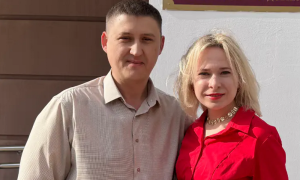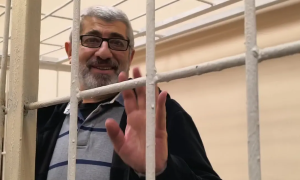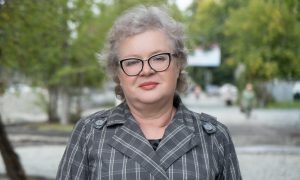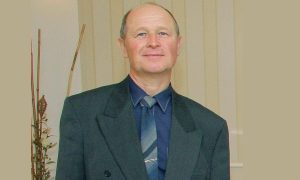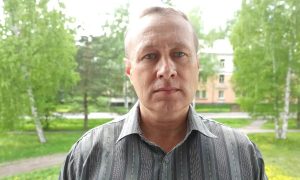In the first conviction deriving from the Supreme Court ban on all Jehovah’s Witness activity, Aleksandr Solovyov was fined nearly a year’s average local wages, although prosecutors had sought to jail him. Six more trials – of 13 defendants – are underway or imminent.
A Jehovah’s Witness in the Urals has become the first person to be convicted of “extremist activity” after the Supreme Court’s 2017 ban on all Jehovah’s Witness activity in Russia. The 49-year-old Aleksandr Solovyov was fined nearly a year’s average local wages, although prosecutors had sought to jail him.
The trials of 13 defendants (three women and 10 men) in six more cases have already begun or appear imminent. Prosecutors submitted these cases to court between late May and early July. Full hearings have already begun in two cases (see below).
A Jehovah’s Witness detained in a recent raid in Kaluga has accused FSB security service officers of torturing him, including by depriving him of food, after he complained about the planting of prohibited literature during their search of his home (see forthcoming F18News article).
This is the second such allegation of torture of Jehovah’s Witnesses by state officials in 2019. In February, seven people in the Khanty-Mansi Autonomous Region reported that they had been beaten and electrocuted by Investigative Committee staff during their interrogations.
FSB, Police, National Guard Investigative Committee and other officials continue to arrest, interrogate, and detain Jehovah’s Witnesses for allegedly “organising” or “participating in the activity of a social or religious association or other organisation in relation to which a court has adopted a decision legally in force on liquidation or ban on the activity in connection with the carrying out of extremist activity” (Criminal Code Article 282.2, Parts 1 and 2), as well as for the alleged “financing of extremist activity” (Criminal Code Article 282.3, Part 1).
A total of 212 people are now known to be under criminal investigation in 38 of Russia’s 83 federal subjects (not counting Crimea and Sevastopol). Thirty-seven are believed to be in pre-trial detention and 29 under house arrest.
Several of those whose homes have been raided are elderly people, and some are now subject to criminal investigation. Ten people aged over 70 are now facing prosecution, including 84-year-old Yelena Viktorovna Zayshchuk from Vladivostok. The over-70s are either under travel restrictions or no known restrictions. The oldest person in pre-trial detention is Vilen Shagedovich Avanesov, who is 66 and from Rostov-on-Don. The oldest person under house arrest is Olga Alekseyevna Opaleva, who is 67, from the Primorye Region town of Spassk-Dalny.
First conviction from Supreme Court ban
Aleksandr Vasilyevich Solovyov (born 13 February 1970) and his wife Anna had just returned from a trip abroad when FSB officers detained them at Perm-2 railway station on the evening of 22 May 2018, and took them away in separate cars. Investigators searched the Solovyovs’ home overnight on 22/23 May 2018. They seized the deeds to the flat, electronic devices, computer drives, their wifi router, photographs, and their collection of Bibles.
Although Anna Solovyova was soon released without charge, Aleksandr was held in a temporary detention centre for two days. Investigators requested that he be placed in pre-trial detention, but on 24 May 2018, Perm’s Sverdlovsk District Court ruled that he should instead be put under house arrest.
On 19 November 2018, Solovyov’s house arrest was lifted, but he remained under specific restrictions and was not permitted to leave his flat, use the phone or the internet, send or receive post, or speak to anyone else involved in the case.
On 4 July 2019, Judge Denis Shvetsov of Perm’s Ordzhonikidze District Court found Solovyov guilty of “participating in the activity of a social or religious association or other organisation in relation to which a court has adopted a decision legally in force on liquidation or ban on the activity in connection with the carrying out of extremist activity” (Criminal Code Article 282.2, Part 2). The Judge fined him 300,000 Roubles. This represents about 11 months’ average wages in Perm for those in formal work.
Prosecutors had sought to have Solovyov jailed for three and a half years. Conviction under Criminal Code Article 282.2, Part 2 can carry a prison term of two to six years or a fine of 300,000 to 600,000 Roubles.
On 12 July, Forum 18 tried to contact Regional Deputy Prosecutor Aleksandr Deryshov, who signed the indictment against Solovyov, to ask why the prosecutors had requested a jail term and whether they intended to appeal against the judge’s decision to fine him. A spokeswoman in Deryshov’s office said that she could not answer questions by telephone.
Forum 18 had already put the same questions in writing to the press service of Perm Regional Prosecutor’s Office on 10 July. Forum 18 had received no reply by the end of the Perm working day on 12 July.
Solovyov has consistently denied any guilt and now intends to appeal, the jw-russia.org website reported on the day of sentencing.
Solovyov stood accused of continuing to take part in the Perm Jehovah’s Witness community, while “being aware of the ban on the activities of this organisation in Russia”, according to a 1 July statement on the district court’s website. Solovyov was previously the chair of the community.
This previously registered local religious organisation was outlawed and dissolved alongside 395 others by the Supreme Court’s 2017 decision to declare the Jehovah’s Witness Administrative Centre and all its subdivisions “extremist”, and ban all Jehovah’s Witness activity in Russia.
According to the jw-russia.org website, Solovyov was arrested and charged merely for having conversations about the Bible. These were recorded by “a small group of Perm residents, who in the past professed Jehovah’s Witness beliefs”, and who had received covert recording equipment from the police.
The court press release states that, according to investigators, Solovyov “deliberately conducted propaganda conversations .. using psychological pressure in the form of persuasion, creating a feeling of guilt, in order to continue illegal extremist activities, [and] encouraged [people] to commit extremist actions aimed at promoting the exclusivity and superiority of the religion of Jehovah’s Witnesses, the recruitment of new members .. the destruction of the family, marriage, and family relations, and the distancing [of members] from differently-thinking family environments”.
“Betrayal has always been and remains the most vile deed,” Solovyov remarked in his closing statement to the court on 27 June. “Those whom I trusted treacherously betrayed me. It was very hard to bear .. but let God be the judge of these people.”
The telephone went unanswered in Judge Shvetsov’s office on 12 July when Forum 18 called to ask why the court had accepted the evidence of informers.
In response to written questions about why the judge had fined Solovyov, Court chair Veronika Dumushkina told Forum 18 on 12 July that judges “are subject only to the Constitution and federal law”, and “consider and resolve criminal cases without external influence. Thus, when sentencing, the court does not refer to the opinion of the prosecution”. She added that, as of 12 July, the court had received no prosecution appeal.
Solovyov observed that he had been “a believer for 25 years, and during this time, there has never been an accusation of extremist activities against Jehovah’s Witnesses here in Perm .. but on 20 April 2017, they were simply named as such by the decision of the Supreme Court. Of course, this led to the illegal persecution of believers. But at all times it only strengthened and united the servants of God.”
Oryol jailing and fine after local ban
Solovyov’s conviction is the first which derives directly from the Supreme Court’s nationwide ban on Jehovah’s Witness activity.
In February 2019 Dennis Ole Christensen, a Danish citizen, and Sergei Skrynnikov were also found guilty under Criminal Code Article 282.2 – in their cases, Part 1 (“organisation of extremist activity”) – for allegedly “continuing the activities” of the Oryol Jehovah’s Witness congregation. That community had been liquidated as an “extremist organisation” in 2016 by order of Oryol Regional Court.
Christensen is now serving a six-year prison term (likely to total about three years once his time in pre-trial detention is taken into account), while Skrynnikov was fined 350,000 Roubles. Both men appealed unsuccessfully against their convictions.
13 more defendants on trial
As of 31 May 2019, 200 Jehovah’s Witnesses (aged between 19 and 84) were known to have been charged or named as suspects for “extremism”-related “crimes”. Many have been placed on http://www.forum18.org/archive.php?article_id=2215″>the Federal Financial Monitoring Service (Rosfinmonitoring) “List of Terrorists and Extremists”, whose accounts banks are obliged to freeze, apart from small transactions.
Between late May and early July, prosecutors submitted a further six cases to court for trial, involving a total of 13 defendants (three women and 10 men). Full hearings have already begun in two cases.
It is unknown when any of these proceedings will end; Aleksandr Solovyov’s trial lasted just under two months from being lodged to the verdict being issued, and had seven full hearings, while Dennis Christensen made 74 appearances over a full year.
Tomsk trial
Sergei Gennadyevich Klimov (born 26 March 1970) – arrested on 3 June 2018, detained since 5 July 2018 in Investigation Prison No. 1, Tomsk; charged under Criminal Code Article 282.2 Part 1; added to Rosfinmonitoring List on 20 June 2019.
Prosecutors lodged his case on 28 May 2019 at October District Court in Tomsk. Four full hearings have taken place before Judge Dmitry Borisov, all of which have been postponed. The next hearing is due to be held on 19 July 2019.Â
Vladivostok trial
Dmitry Viktorovich Barmakin (born 30 May 1974) – arrested in Nakhodka on 28 July 2018; detained since 30 July 2018 in Investigation Prison No. 1, Vladivostok; charged under Criminal Code Article 282.2, Part 1; added to Rosfinmonitoring List on 14 February 2019.
Prosecutors lodged his case on 13 June 2019 at Pervorechensk District Court in Vladivostok. He has so far undergone two hearings, on 26 June and 5 July (both postponed). Barmakin is next due to appear before Judge Stanislav Salnikov on 30 August 2019.
Polyarny, Murmansk Region trial
Roman Nikolayevich Markin (born 18 March 1974) and Viktor Fyodorovich Trofimov (born 26 March 1957) – both arrested on 18 April 2018 and detained no later than 20 April 2018 in Investigation Prison No. 1, Murmansk; put under house arrest on 10 October 2018; released under travel restrictions on 7 February 2019; charged under Criminal Code Article 282.2 Part 1; not on Rosfinmonitoring List.
Prosecutors lodged a single case against both men on 28 May 2019 at Polyarny District Court. Their first full hearing is set to take place on 17 July 2019 before Judge Viktoriya Loginova.
Penza trial
Vladimir Aleksandrovich Alushkin (born 30 June 1964) – arrested on 15 July 2018 and detained in Investigation Prison No. 1, Penza; put under house arrest on 14 January 2019; charged under Criminal Code Article 282.2 Part 1; added to Rosfinmonitoring List on 6 September 2018.
Denis Vladimirovich Timoshin (born 23 March 1980), Andrei Aleksandrovich Magliv (born 20 June 1984), and Vladimir Aleksandrovich Kulyasov (born 17 April 1974) – all arrested on 15 July 2018 and detained for 48 hours; put under house arrest on 17 July 2018; charged under Criminal Code Article 282.2, Part 2; added to Rosfinmonitoring List on 6 September 2018.
Tatyana Sergeyevna Alushkina (born 12 September 1963) and Galiya Anvarovna Olkhova (born 5 February 1970) – neither arrested or detained but criminal case opened on 11 July 2018; both under travel restrictions since at latest 15 April 2019; charged under Criminal Code Article 282.2 Part 2; added to Rosfinmonitoring List on 30 May 2019.
Prosecutors lodged a single case against all six defendants on 1 July 2019 at Penza’s Lenin District Court. Their first hearing is scheduled for 23 July 2019.
Nadezhdinsky District, Primorye trial
Grigory Gennadyevich Bubnov (born 4 September 1965) – arrested 16 July 2018 and put under travel restrictions; charged under Criminal Code Article 282.2 Part 1; added to Rosfinmonitoring List on 11 July 2019.
Prosecutors had lodged their case against him at Nadezhdinsky District Court by 31 May 2019, according to a statement on the Primorye Regional Investigative Committee’s website. It is unknown when the trial will begin.
Kostroma trial
Sergey Alekseyevich Rayman (born 5 October 1996) – http://www.forum18.org/archive.php?article_id=2412″>arrested on 25 July 2018; detained on 26 July 2018 in Investigation Prison No. 1, Kostroma; put under house arrest on 21 September 2018; placed under specific restrictions on 24 October 2018; put under travel restrictions on 22 January 2019; charged under Criminal Code Article 282.2 Part 1; not on Rosfinmonitoring List.
Valeriya Aleksandrovna Rayman, born 21 May 1993 – arrested on 25 July 2018 and detained for 48 hours; released on 27 July 2018 under specific restrictions; put under travel restrictions on 22 January 2019; charged under Criminal Code Article 282.2 Part 2; not on Rosfinmonitoring List.
